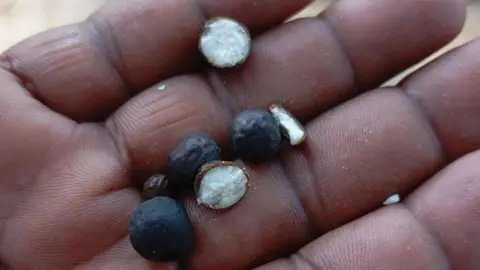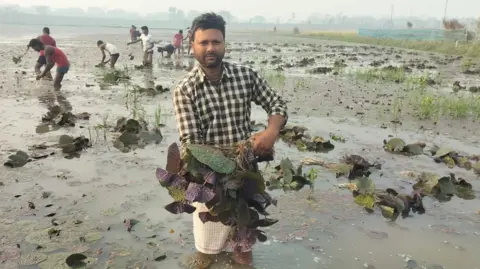 Phool dev Shahni
Phool dev ShahniLike his father and grandfather earlier than him, Phool dev Shahni as soon as made a residing by diving to the underside of 8ft-deep (2.4m), muddy ponds.
“I used to dive in 7 to 8ft of water for hours a day – coming to the floor to breathe after 8 to 10 minutes,” explains Mr Shahni.
Whereas down in these murky depths he was harvesting the seeds of a sort of water lily known as euryale ferox.
Generally known as makhanas, fox nuts or lotus seeds, they’re prized for his or her dietary worth, being excessive in B nutritional vitamins, protein and fibre, with some touting them as a superfood.
Usually eaten as a snack, makhanas are additionally utilized in numerous dishes, together with the milk pudding kheer, in addition to being floor into flour.
Within the north-western Indian state of Bihar, the place Mr Shahni lives, 90% of the world’s makhana is grown.
The leaves of the lily plant are massive and round and sit on the highest of the pond. However the seeds type in pods underneath water and accumulating them was an exhausting course of.
“Whereas we’re on the backside diving, mud enters our ears, eyes, nostril and mouth. Numerous us have pores and skin points because of this. Additionally the plant is roofed in thorns, which give us cuts throughout our physique throughout harvesting of the seeds,” Mr Shahni says.
However lately farmers have modified the cultivation course of. The vegetation at the moment are usually grown in fields, in a lot shallower water.
Harvesting seeds in only a foot of water means Mr Shahni could make twice as a lot cash in a day.
“It is nonetheless arduous work however I’m pleased with my custom. I’ve three youngsters and I’ll be sure that one among my sons continues the legacy of working in a fox nut discipline.”
 Madhubani Makhana
Madhubani MakhanaDr Manoj Kumar, is a type of behind the change in makhana cultivation.
About ten years in the past he realised it could be troublesome to broaden its cultivation in deep ponds.
Now Senior Scientist on the Nationwide Analysis Centre for Makhana (NRCM), he helped to develop the cultivation of lilies in fields of shallow water.
Over the past 4 or 5 years that method has been taking off.
“With our improvements, rising fox nuts is now as simple as any crop grown on land. The one quantity of water wanted is a foot. The employees don’t must work for hours in deep water,” he explains.
And after experiments with totally different seeds, his centre discovered a extra resilient and productive selection, which he says has tripled the earnings of farmers.
Dr Kumar says that makhana cultivation has helped some farmers deal with extra unsure climate circumstances and floods which have hit Bihar lately.
Now NRCM is engaged on machines that may harvest the seeds.
All that innovation has attracted an increasing number of farmers.
In 2022, the world used for fox nut farming was 35,224 hectares (87,000 acres), an virtually threefold enhance over 10 years.
 Dhirendra Kumar
Dhirendra KumarDhirendra Kumar is one farmer who has made a current change to makhana cultivation.
Though he grew up on a farm, he did not wish to observe in his father’s footsteps.
“As farmers we at all times grew wheat, lentils and mustard however ended up shedding some huge cash.
“More often than not floods destroyed the crops,” he says.
Whereas learning for a PhD, he got here into contact with a scientist engaged on makhana cultivation and determined to experiment with the crop on his household farm.
“The outcomes have been wonderful. Within the first 12 months I made a revenue of £340 [US$432],” he says.
Now he grows lilies on 17 acres (6.9 hectares) of land.
“In my wildest goals I didn’t assume that I’d get into rising fox nuts, because it was a labour-intensive job, which was largely carried out by fishermen.”
The change in crop has additionally opened up job alternatives for ladies. Mr Kumar now employs about 200 native girls who sow the seeds.
“My goal is to offer jobs to as many farmers as potential in order that they don’t depart farming due to uncertainty in agriculture,” he says.
 Madhubani Makhana
Madhubani MakhanaIt isn’t simply within the discipline that improvements have been made.
In addition to being one of many main cultivators of makhana, Madhubani Makhana, processes it for export all around the world.
Historically, as soon as the makhanas have been harvested, they’re washed, roasted after which hit with a mallet-like instrument to make them pop.
“The strategy is crude, unhygienic and dangerous. It’s laborious, time-consuming and a lot of instances results in accidents and burns,” says Shambhu Prasad, the founder and chief government of Madhubani Makhana.
In partnership with the NRCM, his firm has developed a machine which roasts and pops the fox seeds.
“This has helped us enhance the standard and the manufacturing of fox nuts,” says Mr Prasad.
Three of the machines have been included into his manufacturing plant in Madhubani, within the north of Bihar.
Whereas innovation within the farming and processing of makhana is rising manufacturing, Mr Prasad doesn’t assume that can be sufficient to see costs fall.
“Given the rising international demand for makhana, vital will increase in manufacturing can be needed to attain any substantial discount in costs,” he says.
Again on his farm, Dhirendra Kumar thinks that makhana cultivation will deliver far-reaching change.
“It’s the start of innovation in Bihar on the subject of fox nut harvesting. It’s going to change the panorama of the state,” he says.


